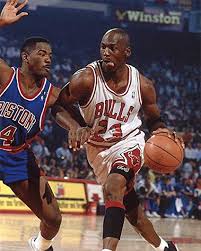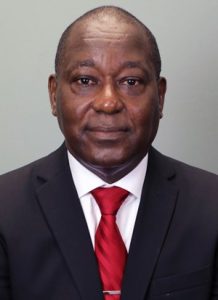When the NCAA tourney got canceled in March we entered a whole new world, which included a sports void the likes of which we have never seen before. The fine folks at ESPN came to the rescue in mid-April with “The Last Dance”, a 10-part miniseries about the 1998 Chicago Bulls and their quest to win a 6th NBA title in an 8-year span before Coach Phil Jackson and most of his star players all went their separate ways. While it has been comforting to spend the past several Sunday nights with behind-the-scenes stories from Steve Kerr/Scottie Pippen/Dennis Rodman, the star of the show as always is Michael Jordan. Even though the documentary concluded on May 17th, HoopsHD’s Jon Teitel has dug through his archives and discovered oodles of unpublished interviews about Jordan’s career, from his early days as the leading scorer for team USA at the 1983 Pan Am Games to a 55-PT playoff performance during Chicago’s final title run in 1998. We continue our trip down memory lane by chatting with David Dumars about Detroit using “The Jordan Rules” to beat Chicago in the 1988 Eastern Conference semifinals and Jordan later calling his brother Joe “the best NBA defender I ever faced”.
In 1985 your brother Joe became the 1st men’s basketball player in Southland history to be named 4-time 1st-team all-conference, and he remains the only 4-time All-Southland tournament selection: how was he able to come in as a freshman and contribute right from the start and then continue to dominate throughout the rest of his college career? He had a strong mindset and worked on it a lot. He was confident and just came out and played.
He graduated from McNeese State as the 11th-leading scorer in NCAA history: did you realize at the time how prolific a player he was? I was off playing football but I heard that my little brother was putting up some big numbers. I knew that he could score but never realized how high he was on the list. Scoring was always going to be there but in the NBA he focused on his defense.
Take me through the legendary 1987 Eastern Conference Finals as a member of the Pistons:
After Boston won the 1st 2 games at home, Detroit won the next 2 games at home by a combined 44 PTS: what do you remember about the bench-clearing brawl between Bill Laimbeer and Larry Bird in Game 3? I actually remember a brawl between Laimbeer and Robert Parish that took place right under the basket (www.youtube.com/watch?v=e7A9-21vRGw).
Boston had a 1-PT win in Game 5 on Bird’s famous last-second steal/assist to Dennis Johnson: did you realize at the time how famous the play would become? No. I remember that the Pistons had that game wrapped up in Boston Garden and would have went back to Detroit up 3-2 in the series. It was a huge turnaround because I think that they would have won it all that year.
In the 1988 Eastern Conference semifinals Detroit used “The Jordan Rules” to beat Chicago in 5 games: what was Joe’s reaction when Michael Jordan later called him “the best NBA defender I ever faced”? I have talked to Joe about that. He admits that he played him tough but no 1 person could stop Jordan: it took a whole team! He knew that he would have to play defense to make the team: most guys just want to be a scorer.
In 1989 he won his 1st NBA title and was voted Finals MVP after scoring 27.3 PPG in the series: what did it mean to him to win a title, and how was he able to play his best when it mattered the most? When those opportunities come along you have to give it your all. We grew up watching the Lakers-Celtics battles on TV so he had all the motivation he needed to beat the Lakers.
In 1990 he won his 2nd-straight title despite learning after Game 3 that your father passed away (he prepared to return home until your mother told him to finish the job): how hard was it for him to get back on the court after your father died, and did you feel like he honored your father’s memory by winning the title? My father would have wanted him to keep playing: when Joe got drafted my dad told him to treat it like a job. He always instilled in us the value of doing the best that we could do. It was a hard thing but we learned growing up to do our job.
In 1994 he was a tri-captain for team USA at the FIBA World Championship (along with Reggie Miller/Shaquille O’Neal): what did it mean to him to represent his country, and what did it mean to him to win a gold medal? Every kid would love the chance to represent their country. My dad always taught us to be humble and never talk about ourselves because if we did a good job then other people would talk about us. Joe was proud just to be on the team and it was a very powerful moment for all of us.
In 1996 he became the 1st recipient of the NBA Sportsmanship Award, which has since been re-named the Joe Dumars Trophy: why was sportsmanship so important to him, and how did it feel to have the award named after him? It goes back to the way that we were brought up: we did not showboat and just played the game the right way. He respected his opponent but also had a killer instinct. To have that trophy named after him was a great reflection on our family and 1 of his proudest accomplishments.
He spent his entire 14-year career with Detroit (becoming 1 of only a handful of guys to play 1000+ games with their original NBA team), where he was a 6-time All-Star/5-time All-Defensive player: why did he stay there his entire career, and why don’t more players remain loyal to their 1st team? Everything you have asked about goes back to my dad: he was on the job for 37 years and it is a reflection of him. He taught us not to chase anything because we could do a great job wherever we are. Joe just made the best of his time in Detroit and raised his family there.
In 2006 he was inducted into the Hall of Fame: when people look back on his career, how do you think that he should be remembered the most? As a guy who did it the right way. He was never in trouble and was a really humble player who was hard-working/dedicated.


